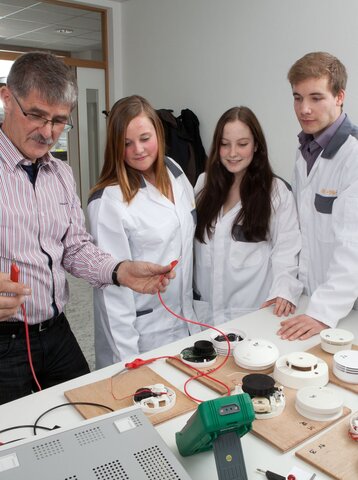Study safety and security
While security looks at criminal attacks on the security of companies (e.g. sabotage, industrial espionage or IT-based crime), safety focuses on topics such as fire protection, explosion protection, hazard prevention, occupational safety and crisis management. In this degree course, we cover both major content areas.
Programme content and structure
Welcome to the world of safety and security
On this programme, you'll learn everything you need to know about preventing potential risks - fire protection, explosion protection, security technology, IT security and data protection, security psychology, risk and disaster management are just some of the exciting course contents. With our combination of security and safety content, you'll make the world a little safer!
Entry requirements
Due to the different aspects of the programme and the many specialisation options, this degree is suitable for a wide range of students. We have many students with previous experience of working in aid organisations. However, this is not a prerequisite! All course content is based on the level of the university entrance qualification.
By the way, you don't necessarily need an Abitur to apply. Internal link opens in the same window:Find out more about applying without an Abitur.
SSB specifics
Our students carry out projects in a wide range of areas, including:
- Analysis and conceptual design of work with fall hazards
- Design and construction of a flash-over box
- Creation of a security policy for an airport
- Situation overview and counter-strategies for commercial timber theft
- Mental stress caused by update processes and their consequences
- Evaluation of the efficiency of sprinkler systems in nursing homes in Germany
- Risk management in preclinical emergency medicine
- Information security and internal offender policy
- Data protection-compliant sample processes in occupational health and safety
- Explosion protection at various locations of an automotive group
- Practical risk assessment in accordance with the Machinery Directive for SMEs
What's included
Special features
Possible additional qualifications
You can acquire these additional qualifications during your studies:
- Fire safety officer according to DGUV Information 205-003
- Occupational safety specialist according to §7 of the Occupational Safety Act
- IT security officer in public administration
- Hazardous incident officer according to 5th BImSchVExpert knowledge in radiation protection S 2.2 and S 4.1
- Specialist knowledge according to §7 Noise and Vibration Ordinance
- Training and examination of expertise in accordance with § 34 a GewO
Our student ambassadors
If you have any questions about studying at SSB, you're welcome to contact our student ambassadors!
You can reach our current students by email at:
Email application is started:studienbotschafter-ssb(at)hs-furtwangen.de
Your career prospects
Bright prospects
Security experts are sought-after specialists who work for a wide range of employers – often in managerial positions. The wide range of subjects covered by the course allows students to work as all-rounders for small and medium-sized companies as well as specialists for large companies, authorities or organisations.
Today, graduates of the Security & Safety Engineering degree programme can work in the following positions:
- in cyber security consulting for a major bank
- as head of occupational safety, environmental protection and plant security at a medical technology company
- in corporate security at a car manufacturer
- as a fire protection engineer for the professional fire department of a large city
- as a self-employed person in your own consultancy office
- as a security coordinator for a transport company
- as a senior security engineer for a research institute

![[Translate to English:] Drei Personen arbeiten an einem Schaltplan](https://www.hs-furtwangen.de/fileadmin/_processed_/c/c/csm_GSG-SSB_2U2A5881_21f5b06537.jpg)
![[Translate to English:] Person steuert ein Messgerät](https://www.hs-furtwangen.de/fileadmin/_processed_/8/7/csm_GSG-SSB_2U2A5924_d921e6ca1e.jpg)
![[Translate to English:] Person sieht durch ein Mikroskop](https://www.hs-furtwangen.de/fileadmin/_processed_/f/5/csm_GSG-SSB_2U2A6131_eee80a6f95.jpg)
![[Translate to English:] Person pipettiert hinter Glas](https://www.hs-furtwangen.de/fileadmin/_processed_/2/3/csm_GSG-SSB_2U2A6294_b15f12f6a1.jpg)
![[Translate to English:] Wärmebildkamera](https://www.hs-furtwangen.de/fileadmin/_processed_/f/c/csm_GSG-SSB_2U2A6378_9cfa05b5bd.jpg)
![[Translate to English:] Professor hält Vorlesung](https://www.hs-furtwangen.de/fileadmin/_processed_/3/8/csm_GSG-SSB_2U2A6547_0cd41a78ba.jpg)
![[Translate to English:] Person sitzt am Steuer eines Fahrzeugs](https://www.hs-furtwangen.de/fileadmin/_processed_/9/3/csm_GSG-SSB_22-06-21_11-16-48_8056_02c04d15f9.jpg)
![[Translate to English:] Gruppenbild auf einer Exkursion](https://www.hs-furtwangen.de/fileadmin/_processed_/b/0/csm_GSG-SSB_22-06-21_17-46-10_8086_d0ade4ff86.jpg)
![[Translate to English:] Personen mit Sicherheitshelmen](https://www.hs-furtwangen.de/fileadmin/_processed_/1/d/csm_GSG-SSB_22-06-22_11-44-24_8126_137c701156.jpg)
![[Translate to English:] Personen mit Sicherheitshelmen](https://www.hs-furtwangen.de/fileadmin/_processed_/6/8/csm_GSG-SSB_22-06-22_12-33-20_8190_9b237b9acd.jpg)
![[Translate to English:] Gruppenfoto von Personen in Kitteln](https://www.hs-furtwangen.de/fileadmin/_processed_/0/4/csm_GSG-SSB_22-06-23_09-12-21_8234_f30f2d13f4.jpg)
![[Translate to English:] Versuchsaufbau](https://www.hs-furtwangen.de/fileadmin/_processed_/e/c/csm_GSG-SSB_22-06-23_15-11-45_8330_1b695fbc01.jpg)
![[Translate to English:] Wärmebildkamera](https://www.hs-furtwangen.de/fileadmin/_processed_/0/3/csm_GSG-SSB_Daumen_Waermebild_99c0a36c9e.jpg)
![[Translate to English:] Gruppe arbeitet am Tisch](https://www.hs-furtwangen.de/fileadmin/_processed_/5/9/csm_GSG-SSB_IMG_3270_b57f173989.jpg)
![[Translate to English:] Person pipettiert hinter Glas](https://www.hs-furtwangen.de/fileadmin/_processed_/e/2/csm_GSG-SSB_Pipette_unter_Abzug_d53ffb0465.jpg)
![[Translate to English:] Professor hält Vorlesung](https://www.hs-furtwangen.de/fileadmin/_processed_/9/e/csm_GSG-SSB_Weber_U_Safety-01_992147b046.jpg)

